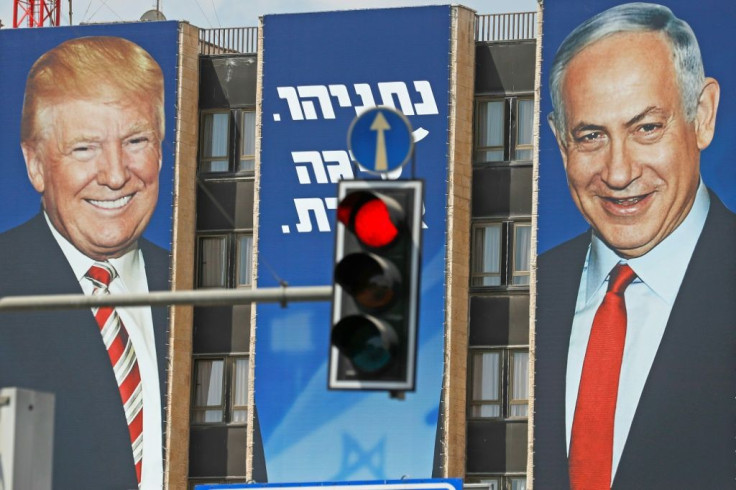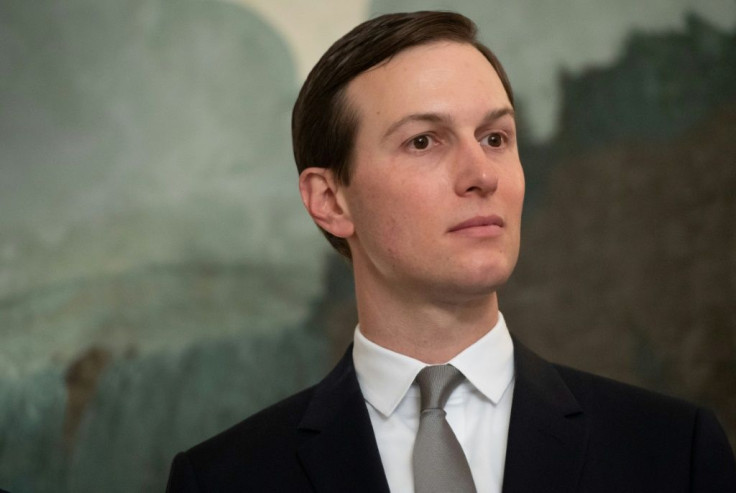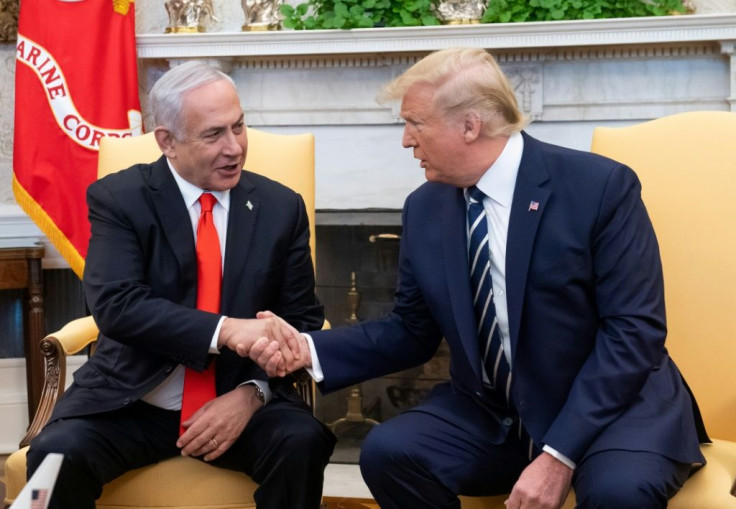Trump Insists Israeli-Palestinian Plan Has A 'Chance'

President Donald Trump said alongside visiting Prime Minister Benjamin Netanyahu on Monday that his Israeli-Palestinian peace plan has a "chance" -- despite being flatly rejected by the Palestinians.
Trump, who also met later with Netanyahu's election rival Benny Gantz, said the plan would be unveiled at 12:00 pm (1700 GMT) Tuesday.
Palestinians have already panned the White House peace plan, saying it is overwhelmingly biased toward Israel. No Palestinian leaders were invited to the White House.
But Trump told reporters that "it might have a chance" and that "we're relatively close."
"We think we will have ultimately the support of the Palestinians," he said. The plan is "something they should want... It's very good for them, in fact it's overly good for them."
Trump also said that "many of the Arab nations" back his initiative.
Netanyahu praised Trump as "the greatest friend that Israel's had in the White House" and once more described the peace plan as "the deal of the century."
The twin White House meetings with Netanyahu and Gantz thrust Trump right into Israel's tense election scheduled in just over a month.
Netanyahu's right-wing Likud and Gantz's centrist Blue and White party are polling neck-and-neck.
For Netanyahu in particular the high-profile meeting and favorable peace plan will reinforce his message that he has the US president's ear. By contrast, Gantz's Oval Office talks were held out of sight of the media, although a photo, apparently taken by staff, did circulate of the two men shaking hands.

For Trump, the peace plan roll-out gives a welcome distraction from his impeachment trial in the Senate, while also boosting Netanyahu's standing as he fights corruption charges back home.
The Palestinians say they were never included in crafting the plan, which was overseen by Trump son-in-law Jared Kushner.
Palestinian prime minister Mohammed Shtayyeh on Monday urged international powers to boycott the plan, which he said was designed "to protect Trump from impeachment and protect Netanyahu from prison."
"It is not a Middle East peace plan," Shtayyeh told a cabinet meeting. "This plan gives Israel sovereignty over Palestinian territory."

The plan, whose details remain unclear, has been gestating in secret for so long that skeptics asked whether it even really existed.
Aaron David Miller, a Mideast expert with the Carnegie Endowment for International Peace, said Kushner's team wants to "finally, basically demonstrate that they have a plan" -- and to do so ahead of the US presidential election.
In the short term, said Dennis Ross, a US diplomat who worked on the issue under several administrations, "anything that can divert attention away from what's going on" is the goal.
Trump has already thrown Netanyahu a string of political presents.
These include breaking with international diplomatic consensus to recognize the disputed city of Jerusalem as the Israeli capital, recognizing Israeli sovereignty over the Golan Heights, which were seized from neighboring Syria, and ending opposition to Israeli settlements on occupied Palestinian land.
Last Thursday, Trump described the still-unpublished peace plan as "great" and said it "really would work."
Netanyahu said before leaving for Washington that he was "full of hope that we can make history."
Gantz is also enthusiastic, saying the plan will "go down in history," allowing "different players in the Middle East to finally move ahead towards an historic regional agreement."
But on Sunday, Palestinian leaders warned that instead of bringing peace, the plan could trigger their withdrawal from key provisions of the decades-old Oslo Accords, which sought to map out peaceful Israeli-Palestinian relations.
"The US administration will not find a single Palestinian who supports this project," the Palestinian foreign ministry said in a statement on Sunday.
"Trump's plan is the plot of the century to liquidate the Palestinian cause."
Netanyahu is campaigning on a continuation of his hardline policies that he says are needed to provide security for Israelis, but that critics say condemn Palestinians in the occupied territories to an increasingly bleak future.
Adding to the prime minister's worries, the transnational jihadist Islamic State group on Monday reportedly vowed to make Israel its main target.
According to a purported audio message of its spokesman, IS leader Abu Ibrahim al-Hashimi al-Quraishi is encouraging the group's fighters to "launch a new phase," with major operations against Israel.
© Copyright AFP 2024. All rights reserved.




















